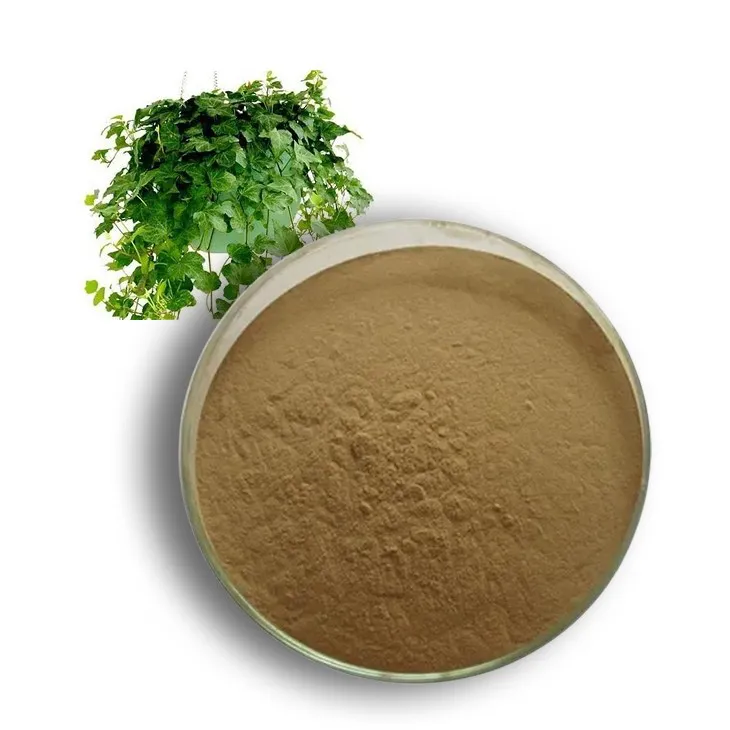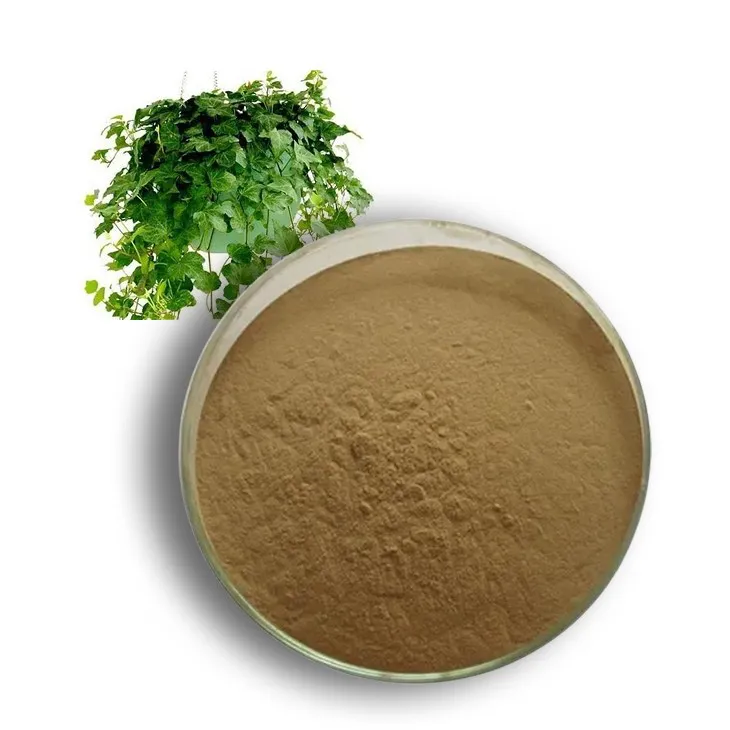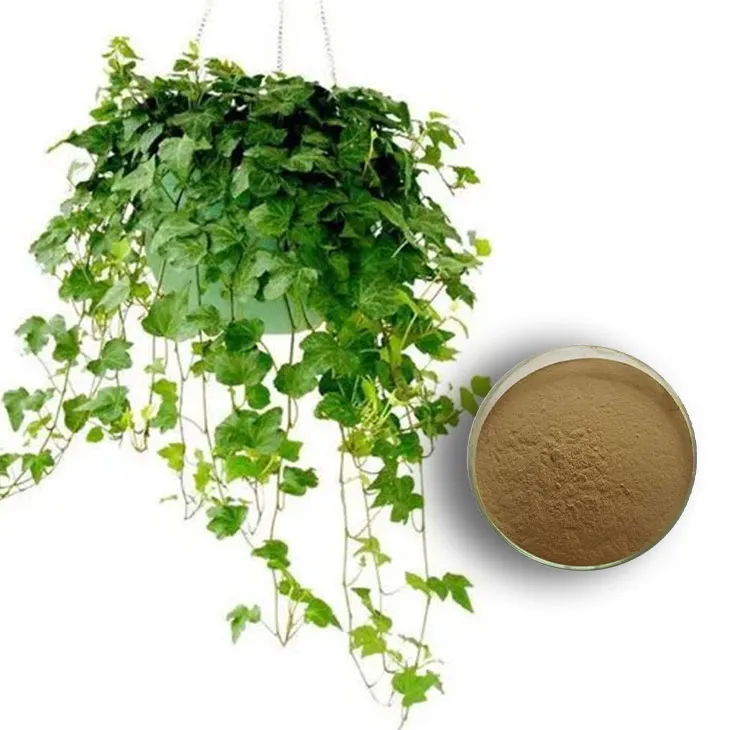- 0086-571-85302990
- sales@greenskybio.com
Benefits of Ivy Extract: An Impressive Extract on the Kitchen Table.
2024-11-13

1. Introduction to Ivy Extract
Ivy, a common plant known for its climbing vines, has been used for various purposes throughout history. Ivy Extract is derived from different parts of the ivy plant, such as the leaves. It contains a complex mixture of bioactive compounds that contribute to its unique properties.

2. Health - Enhancing Properties
2.1 Respiratory Health
One of the most notable potential health benefits of Ivy Extract is its impact on respiratory health. Ivy extract has been studied for its ability to soothe coughs and reduce mucus production. It may act on the airways, helping to relieve irritation and inflammation. For those suffering from bronchitis or other respiratory ailments, ivy extract could potentially be a natural remedy. Some studies suggest that it may help to open up the airways, making breathing easier. However, it is important to note that more research is still needed to fully understand its mechanisms and effectiveness in treating respiratory conditions.
2.2 Anti - Inflammatory Effects
The anti - inflammatory properties of ivy extract are also of great interest. Inflammation is at the root of many chronic diseases. Ivy extract contains compounds that may inhibit the body's inflammatory response. This could be beneficial in conditions such as arthritis, where joint inflammation causes pain and reduced mobility. By reducing inflammation, it may potentially relieve pain and improve the quality of life for those with inflammatory disorders. Additionally, it might also play a role in reducing inflammation in other parts of the body, such as the skin. In cases of skin inflammation or eczema, ivy extract - based products could potentially be used topically to soothe the affected areas.
2.3 Immune System Support
Another aspect of ivy extract's potential health benefits is its role in supporting the immune system. A healthy immune system is crucial for fighting off infections and diseases. Ivy extract may contain substances that can boost the immune system. These substances could stimulate the production of immune cells or enhance their function. For example, it might help the body to better recognize and respond to pathogens. This could be especially important during the cold and flu season or in environments where there is a high risk of infection. However, like other health claims related to ivy extract, more scientific evidence is required to firmly establish its role in immune system support.

3. Culinary Uses of Ivy Extract
3.1 Flavor Profile
Ivy extract has a unique flavor profile that can add a distinct touch to culinary creations. It has a slightly earthy and herbaceous flavor, with a hint of bitterness. This flavor can be used to enhance the taste of various dishes. For example, in savory dishes such as stews or casseroles, a small amount of ivy extract can add depth and complexity. It can also be used in marinades for meats or vegetables, imparting its unique flavor and helping to tenderize the ingredients. In some traditional cuisines, ivy has been used for centuries in cooking, and modern chefs are starting to rediscover its potential in the kitchen.
3.2 Garnishing and Presentation
Beyond its flavor, ivy extract can also be used for garnishing and presentation. A few drops of ivy extract can be added to a sauce or dressing, not only for flavor but also to give a beautiful green color. It can be used to create artistic designs on plates, adding an element of elegance to the presentation of a dish. For example, in fine - dining restaurants, chefs may use ivy extract to create a visually appealing pattern on a dessert plate or to add a finishing touch to a salad.

4. How to Incorporate Ivy Extract into Your Daily Life
4.1 Dietary Supplements
One of the easiest ways to incorporate ivy extract into your daily life is through dietary supplements. These supplements are available in various forms, such as capsules or tablets. When choosing a dietary supplement, it is important to look for a reputable brand that ensures the quality and purity of the extract. Follow the recommended dosage instructions carefully, as taking too much ivy extract may have potential side effects. It is also advisable to consult a healthcare professional before starting any new supplement, especially if you have pre - existing health conditions or are taking other medications.
4.2 Culinary Applications
If you are interested in using ivy extract in your cooking, start with small amounts to familiarize yourself with its flavor. You can add it to your favorite recipes gradually, adjusting the quantity according to your taste preferences. Experiment with different types of dishes, such as soups, sauces, or baked goods. For example, you could add a few drops of ivy extract to a homemade tomato sauce to give it a unique twist. When using ivy extract in cooking, make sure it is food - grade and suitable for consumption.
5. Precautions and Considerations
5.1 Toxicity
While ivy extract has potential benefits, it is important to be aware of its toxicity. Ivy plants contain certain substances that can be harmful if ingested in large quantities or in their raw form. The extraction process should be carefully controlled to ensure that the final product is safe for consumption. It is crucial not to attempt to make your own ivy extract at home without proper knowledge and equipment, as this could lead to dangerous levels of toxicity. Only use commercially available ivy extract products that have been tested for safety.
5.2 Allergic Reactions
Some individuals may be allergic to ivy extract. Allergic reactions can range from mild skin rashes to more severe respiratory distress. If you have a history of allergies, especially to plants in the same family as ivy, it is advisable to be cautious when using ivy extract. Before using any products containing ivy extract, perform a patch test on a small area of skin to check for any adverse reactions. If you experience any signs of an allergic reaction, such as itching, swelling, or difficulty breathing, stop using the product immediately and seek medical attention.
6. Conclusion
Ivy extract is a fascinating substance with a wide range of potential benefits. From its possible health - enhancing properties to its creative uses in the kitchen, it has the potential to be a valuable addition to our daily lives. However, it is important to approach its use with caution, considering the potential risks such as toxicity and allergic reactions. With further research, we may gain a more comprehensive understanding of ivy extract and be able to fully harness its potential in promoting well - being and enhancing culinary experiences.
FAQ:
What are the potential health - enhancing properties of ivy extract?
Ivy extract may have several potential health - enhancing properties. It has been studied for its antioxidant effects, which can help combat free radicals in the body. Some research also suggests it may have anti - inflammatory properties, potentially helping with various inflammatory conditions. Additionally, it might have a positive impact on respiratory health, although more research is needed to fully understand these effects.
How can ivy extract be used in culinary creations?
Ivy extract can be used in culinary creations in various ways. It can be added to salad dressings to give a unique flavor. Some chefs use it in marinades for meats or fish to add an interesting and earthy taste. It can also be used sparingly in desserts, perhaps in a glaze or a flavored cream, to impart a different and novel flavor profile. However, it should be used with caution as it may have a strong flavor.
Is ivy extract safe for everyone to use?
While ivy extract may offer potential benefits, it is not safe for everyone. Some people may be allergic to it, which can cause skin rashes, itching, or in more severe cases, respiratory problems. Pregnant or breastfeeding women should also avoid using it without consulting a healthcare provider, as its safety in these situations has not been fully established. People with certain medical conditions, such as kidney or liver problems, may need to be especially cautious when considering the use of ivy extract.
Where can one obtain high - quality ivy extract?
High - quality ivy extract can be obtained from various sources. Specialty health food stores often carry it in the form of tinctures or extracts. Some online retailers that focus on natural products may also sell reliable ivy extract. However, it is important to ensure that the source is reputable. Look for products that are labeled with information about their extraction process and purity, and if possible, choose those that have been third - party tested for quality.
How should ivy extract be stored?
Ivy extract should be stored in a cool, dry place away from direct sunlight. If it is in a liquid form, it is best to keep it in a dark - colored glass bottle to protect it from light. Make sure the container is tightly sealed to prevent air from spoiling the extract. Follow any specific storage instructions provided on the product label, as different formulations may have slightly different requirements.
Related literature
- The Health Benefits of Ivy Extract: A Comprehensive Review"
- "Ivy Extract in Culinary Arts: Innovative Uses and Considerations"
- "Safety Aspects of Ivy Extract Consumption: Current Research"
- ▶ Hesperidin
- ▶ citrus bioflavonoids
- ▶ plant extract
- ▶ lycopene
- ▶ Diosmin
- ▶ Grape seed extract
- ▶ Sea buckthorn Juice Powder
- ▶ Beetroot powder
- ▶ Hops Extract
- ▶ Artichoke Extract
- ▶ Reishi mushroom extract
- ▶ Astaxanthin
- ▶ Green Tea Extract
- ▶ Curcumin Extract
- ▶ Horse Chestnut Extract
- ▶ Other Problems
- ▶ Boswellia Serrata Extract
- ▶ Resveratrol Extract
- ▶ Marigold Extract
- ▶ Grape Leaf Extract
- ▶ blog3
- ▶ blog4
- ▶ blog5
-
Organic Tongkat Ali extract powder factory.
2024-11-13
-
How to make powder with ashwagandha extract.
2024-11-13
-
Rosehip extract manufacturers from China.
2024-11-13
-
The best cat's claw extract in nature.
2024-11-13
-
Chinese Dandelion Leaf Extract Suppliers.
2024-11-13
-
Black Garlic Extract
2024-11-13
-
Purple Sweet Potato Extract
2024-11-13
-
Apricot Powder
2024-11-13
-
Polygonum Cuspidatum Extract
2024-11-13
-
Honeysuckle Pollen
2024-11-13
-
Rosemary extract
2024-11-13
-
Fig Extract
2024-11-13
-
Withania Somnifera Extract
2024-11-13
-
Nettle leaf extract
2024-11-13
-
Longan Extract
2024-11-13





















